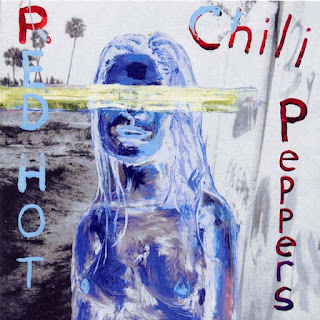V2.33
Never a band to allow grass to grow beneath their feet when they could be mowing it down with funky rhythms and staccato guitar riffs, the Red Hot Chili Peppers may well be the quintessential Los Angeles rockers. They kick off their recently released By the Way (Warner Bros.) with the booming title track. Anthony Kiedis’ voice is honed to a fine instrument from years of experience, mixing old-school, Sinatra-styled crooning with a staggering, free-style rapped chorus laid on top of Flea’s (Michael Balzary) superfly bass lines.
Songs like “Cabron” or “The Zephyr Song” illustrate John Frusciante’s incredible guitar prowess, the six-string maestro quite capable of shredding the strings if the moment calls for it, but also able to weave intricate, beautiful instrumental passages behind Kiedis’ lyrics. Because the Chili Peppers have a world-class musician in bassist Flea, the band’s material tends to lean towards a more rhythm-heavy groove while drummer Chad Smith, hidden in the back, is as solid a beatmaster as a band could ever want. The Chili Peppers’ wonderful chemistry, the enthusiasm of the players and the member’s shared experiences (and tragedies) make for exciting music, By the Way as good a rock ‘n’ roll album as you’re going to find this year.
The blues and jazz are America’s two greatest contributions to the shared vocabulary of music, both genres forever intertwined stylistically and both created by African-American musicians in the early part of the twentieth century. Much like the blues, jazz has many different faces, from the big-band swing of Duke Elllington to the hepcat cool of Dave Brubeck and the manic free improvisation of Miles Davis. Jazz is perfectly structured in that it lends itself to both individual achievement and group collaboration. No other jazz band in the history of the genre has had more influence on the style than Weather Report, however. The recent reissue of the groundbreaking 1976 album Black Market (Legacy Recordings), the band’s sixth studio effort, perfectly illustrates the impact that Weather Report would have not only on the world of jazz but on rock ‘n’ roll as well.
Formed in 1970 by keyboardist Joe Zawinul and saxman Wayne Shorter, Weather Report would experience an ever-changing roster of talent through the fifteen-year lifespan of the band, yet always produced a cohesive sound backed by Zawinul’s unwavering vision. Black Market is interesting in that the album represents a transitional period for the band, the great Jaco Pastorious replacing Alphonso Johnson in the line-up (tho’ both play on various tracks), and no fewer than three drummers contributing to the album. Zawinul and Shorter lead the pack, the seven songs composed for Black Market incorporating elements of classic improvisational jazz and electronic experimentation, with undertones of funk and rock and the early signs of Zawinul’s flirtation with world music rhythms and forms. The resulting performances are near flawless, amazing in their scope and invigorating in their execution. Black Market would set the stage for the following year’s Heavy Weather, the band’s best-selling album and one that would see Pastorious taking on a greater creative role in the band. For music lovers whose knowledge of jazz doesn’t extend beyond Kenny G, pick up a copy of Weather Report’s Black Market and get a taste of the real thing...
Folk music is a tricky thing, the format not particularly beloved of radio programmers and label A&R men. Sure, stars like Jewel or Sheryl Crow might pay lip service to their folk roots, but an honest-to-goodness modern day folkie is as estranged from popular music as pro wrestling is from subtlety. All of which makes the gradual upward career arc of folk singer/songwriter Brian Gladstone all the more impressive (and encouraging). The Toronto-based musician recorded his first album, One Step Beyond the Dirt with equipment bought on the cheap at local music stores. Taking the punk rock DIY ethic to the extreme, Gladstone bought a computer, designed his own promotional materials and began the chore of marketing himself to both potential listeners and the industry. He achieved a modicum of radio airplay, sold a few CDs and eventually had that first album – originally a basement demo – picked up for European distribution.
Gladstone’s second album, the excellent Psychedelic Pholk Songs (Back To The Dirt) successfully beats the sophomore curse, delivering a wonderful collection of literate and often-humorous songs. “Asphalt Cowboy” leads off the album, a delightfully tongue-in-cheek rave-up that sums up the hopes and aspirations of every artist who ever made their way to Nashville in search of fame and fortune as a country singer. The song throws away better lines than most Music City songsmiths will pen this year (I particularly like “It’s so hard to get paid/Working at my special trade/I like to sleep all day and then/I listen to CDs”). “Mega City Mel” is a sprightly tale accompanied by a ragtime rhythm, “A Father’s Lullaby” Gladstone’s lovely and loving ode to his three children.
Gladstone is an imaginative and intuitive songwriter and a natural storyteller, unrestrained by conventional limitations. A fair-to-middling’ guitar picker, Gladstone has a friendly voice and an infectious musical personality. Your humble scribe doesn’t know a whole lot about folk music, but know what I like and I like Psychedelic Pholk Songs more every time I listen to it. Psychedelic Pholk Songs is a real breath of fresh air, an honest album by a real musician. You won’t find any Pro Tools enhancement or studio polish on Psychedelic Pholk Songs, Brian Gladstone’s music beautiful in its flaws and flawless in its sincerity. (View From The Hill, August 2002)




No comments:
Post a Comment